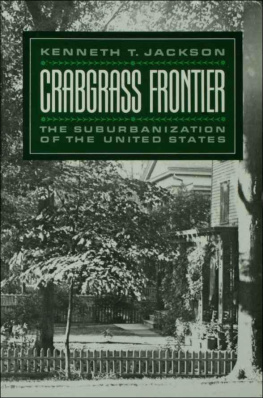CRABGRASS FRONTIER
CRABGRASS FRONTIER
The Suburbanization
of the United States
Kenneth T. Jackson

Oxford University Press
Oxford New York Toronto
Delhi Bombay Calcutta Madras Karachi
Petaling Jaya Singapore Hong Kong Tokyo
Nairobi Dar es Salaam Cape Town
Melbourne Auckland
and associated companies in
Beirut Berlin Ibadan Nicosia
Copyright 1985 by Oxford University Press, Inc.
First published in 1985 by Oxford University Press, Inc.,
198 Madison Avenue, New York, New York 10016-4314
First issued as an Oxford University Press paperback, 1987
Oxford is a registered trademark of Oxford University Press
All rights reserved. No part of this publication may be reproduced,
stored in a retrieval system, or transmitted, in any form or by any means,
electronic, mechanical, photocopying, recording, or otherwise,
without the prior permission of Oxford University Press, Inc.
Library of Congress Cataloging in Publication Data
Jackson, Kenneth T.
Crabgrass frontier.
Bibliography: P.
Includes index.
1. SuburbsUnited StatesHistory. 2. Suburban life.
3. HousingUnited StatesHistory. 4. United StatesSocial conditions.
1. Title.
HT384.U5J33 1985 307.740973 85-4844
ISBN-13 978-0-19-503610-7
ISBN-13 978-0-19-504983-1 (pbk.)
printing, last digit: 30 29 28
Printed in the United States of America
For Barbara
and
To the bright, enduring memory of our son,
Kenneth Gordon Jackson II
(19681984)
O my son Absalom,
my son, my son Absalom!
would God I had died for thee
2 Samuel 18
Acknowledgments
Over the protracted course of this investigation I have incurred more debts than I could possibly acknowledge here. The National Endowment for the Humanities, the John Simon Guggenheim Memorial Foundation, and the American Council of Learned Societies provided senior fellowships and freedom, while the 1982 Banneker Professorship at The George Washington University enabled me to follow up many leads at the Department of Housing and Urban Development and at the National Archives. Columbia Universitys Council for Research in the Social Sciences and the Department of Historys Dunning Fund generously helped with typing expenses. My research trips around the country were made more pleasant and more useful because of the hospitality and lodging provided by Joyce Dalbey in Houston; by Dale and Douglas Curry in New Orleans; by Sarah and Austin Tothacer in Columbia, S.C.; by Patsy and Lewis Lanter in Atlanta; by Phyllis and Roger Lotchin in Chapel Hill; by Darryl and Michael Ebner and by Carolyn and Jan Benjamin in Chicago; by Juanita and Hiram Caroom in Jacksonville; by Mark Haller in Philadelphia; by Estelle and Bob Crenshaw in Dallas; by Wanda and Alan Goldstein in Dayton; by Anne and Thomas Scheckells, by Thomas M. McNair, and by Patrick W. Murphy in Washington; by Harry L. Davis in Denver; by Paula and Max Schouten, by Sally and John Cunningham, and by Mary and John Heilner in Westchester; by Betty and Robert Hume in San Jose; by Gaither and Byron Smith in San Francisco; by Kenneth M. Batinovich and by Sue and Clelland Downs in Los Angeles; and by Sally and Pete Finch in San Diego. Christine and Val Sharp found me on their doorsteps in Lake Forest, Greenwich, and Ladue on more than a dozen occasions, and each time they opened their homes and refrigerators and proved to be the closest possible friends. In Memphis Carolyn and John Parish have always treated me as the son they never had, while my mother, Elizabeth Willins Jackson, has been so supportive, kind, and thoughtful over the years that my friends often claim her as their own.
My dependence upon the work of other authors will be obvious to anyone with a passing familiarity with the topic. I have tried to acknowledge specific debts in the notes, but the extent of my borrowing will be evident only to the individuals concerned. For numerous criticisms and suggestions, I am grateful to Alan F. J. Artibise, John F. Bauman, Stanley Buder, Clara Cardia, Michael Conzen, Leonard Dinnerstein, Michael Ebner, Roderick French, David R. Goldfield, Susan S. Hallas, David Halle, Glen E. Holt, Timothy Jacobson, Roger Lotchin, Michael McCarthy, Zane L. Miller, Jon A. Peterson, Stanley K. Schultz, Allen Share, Bayrd Still, Joel A. Tarr, Sam Bass Warner, Jr., Margaret Kurth Weinberg, and Olivier Zunz. Deborah S. Gardner, Camilo J. Vergara, and Carol Willis shared their photographs with me, while George Tremberger took time from his backbreaking schedule to draw maps and charts for this book. At American Heritage Publishing Company, Patrick Bunyan located suitable prints in an enormous collection, as did Janet Parks and Jay Hendrickx at Avery Architectural Library. At the Department of Housing and Urban Development, Frederick J. Eggers, Mary A. Grey, William A. Rolfe, and Joan Gilbert (now of Yale University) helped me through the bureaucratic tangle, while Joseph B. Howerton, Jerry N. Hess, and Charles Gellert showed me where and how to roam in the National Archives. Ben H. Graham, Wallace E. Johnson, and Martin Winter generously took time from their construction businesses to reminisce about the home-building industry.
At Columbia University, where I have taught for the past seventeen years, Stuart Bruchey, Ainslie Embree, Herbert J. Gans, John A. Garraty, Henry F. Graff, Herbert S. Klein, Peter Marcuse, Robert A. McCaughey, Eric L. McKitrick, Robert O. Paxton, Rosalind Rosenberg, Elliott Sclar, James P. Shenton, Alden T. Vaughan, and Gwendolyn Wright have been unselfish scholars and delightful colleagues. William E. Leuchtenburg was the first person I met on Morningside Heights. He has since left New York, but only after encouraging and assisting me in every possible professional and personal way. His careful, thorough scholarship continues to serve as my model. Many former students, especially James Baughman, David Bensman, Eugenie Ladner Birch, William N. Black, Kenneth Cobb, Estelle Freedman, Deborah Gardner, Mark Gelfand, Timothy Gilfoyle, Jacquelyn Dowd Hall, David Hammack, Clifton Hood, Betsy W. Kearns, Thomas Kessner, Veronique Marteau, Eleanora Schoenebaum, David Schuyler, Frank Vos, Ray Weisman, and Carol Willis may recognize their own insights in the pages which follow. My mentor, Richard C. Wade, coined the phrase Crabgrass Frontier and first excited me about urban history two decades ago at the University of Chicago. He knows how important his ideas and his example have been to me ever since.
At Oxford University Press, Sheldon Meyer has been a patient and close friend and a valued counselor, while Pamela Nicely has saved me from dozens of careless mistakes. Whatever errors remain are my own.
Several parts of Crabgrass Frontier have been previously published elsewhere, and I wish to thank Princeton University Press, the Center for Advanced Study in the Behavioral Sciences, the Journal of Urban History, Chicago History, the Columbia Historical Society, Sage Publications, Wadsworth Publishing Company, and Doubleday and Company for permission to reprint portions of earlier essays.
The most important person in this effort has been my wife. I owe this book, as well my two children and most of the other good things in my life, to Barbaras devotion, sacrifice, and inspiration. She enabled me to see things I otherwise never would have noticed, and she helped me to survive in the face of heartbreaking tragedy. For better, and now for worse, she has shared everything with me for twenty-three years, and I hope the dedication conveys some sense of my appreciation and love.
Next page









